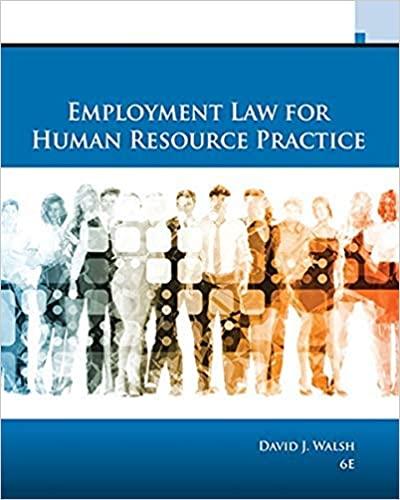Young was a delivery driver for UPS. In 2006, she requested a leave of absence in order
Question:
Young was a delivery driver for UPS. In 2006, she requested a leave of absence in order to undergo in vitro fertilization. The procedure was successful, and Young became pregnant. During her pregnancy, her medical practitioners advised her not to lift more than twenty pounds while working. UPS’s employee policy requires their employees to be able to lift up to seventy pounds. Due to Young’s inability to fulfill this work requirement, and the fact that she had used all of her available family and medical leave, UPS forced her to take an extended, unpaid leave of absence. During this period, she eventu7ally lost her medical coverage. Young gave birth in April 2007 and resumed working at UPS thereafter. Young sued UPS claiming she had been the victim of gender and disability based discrimination under the Americans with Disabilities Act and the Pregnancy Discrimination Act. UPS moved for summary judgment arguing that Young could not show that its decision was based on her pregnancy or that she was treated differently than a similarly situated co-worker. UPS also argued it had no obligation to offer Young accommodations under the ADA because her pregnancy did not constitute a disability. The district court di8smissed her claim, and the U.S. Court of Appeals for the Fourth Circuit affirmed. She appealed to the U.S. Supreme Court.
1. What is the legal issue in this case? What did the Court decide (in the majority opinion authored by Justice Breyer)?
2. What does the second clause (“prong”) of the Pregnancy Discrimination Act say? What interpretation of this clause did the plaintiff argue for? What interpretation did the defendant argue for?
3. What interpretation of this clause does the Court majority adopt? How can plaintiffs prove that denial of a requested “accommodation” is pregnancy discriination? Is it likely that, on remand, Young will be able to prove that UPS’s denial of a light-duity assignment was discrimiation? Why or why not?
4. Why does Justice Scalia in his dissenting opinion disagree with the decision of the Court? Are these denial of accommodation cases more appropriately treated as disparate impact claims? Would doing so have made a difference in this case? Why or why not?
Step by Step Answer:






